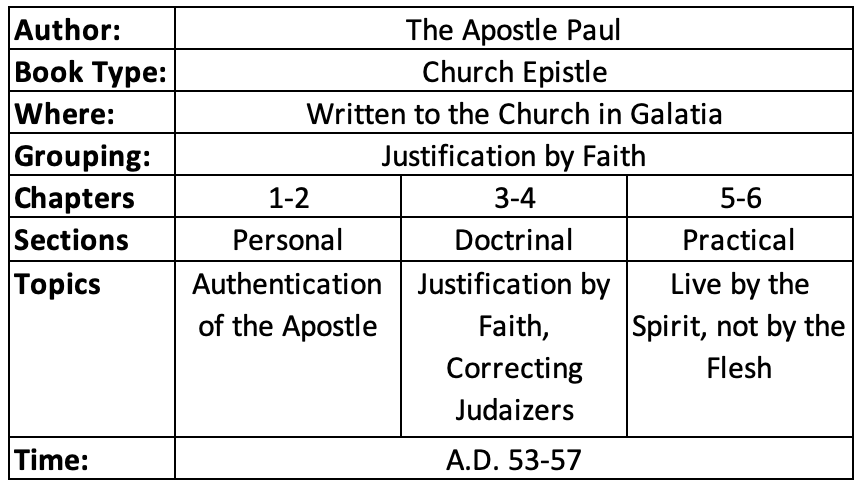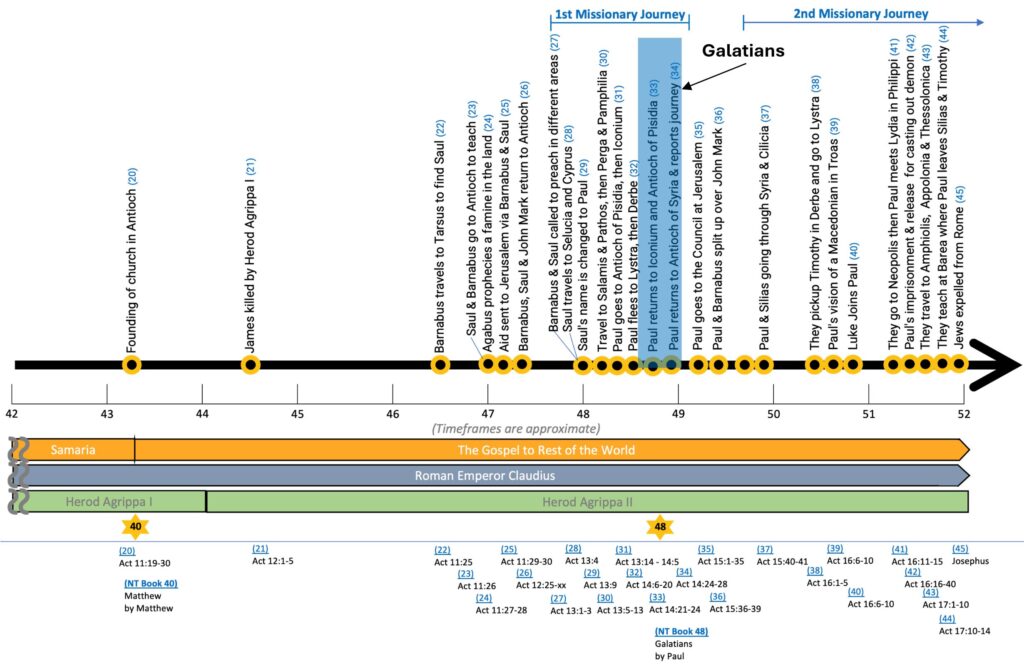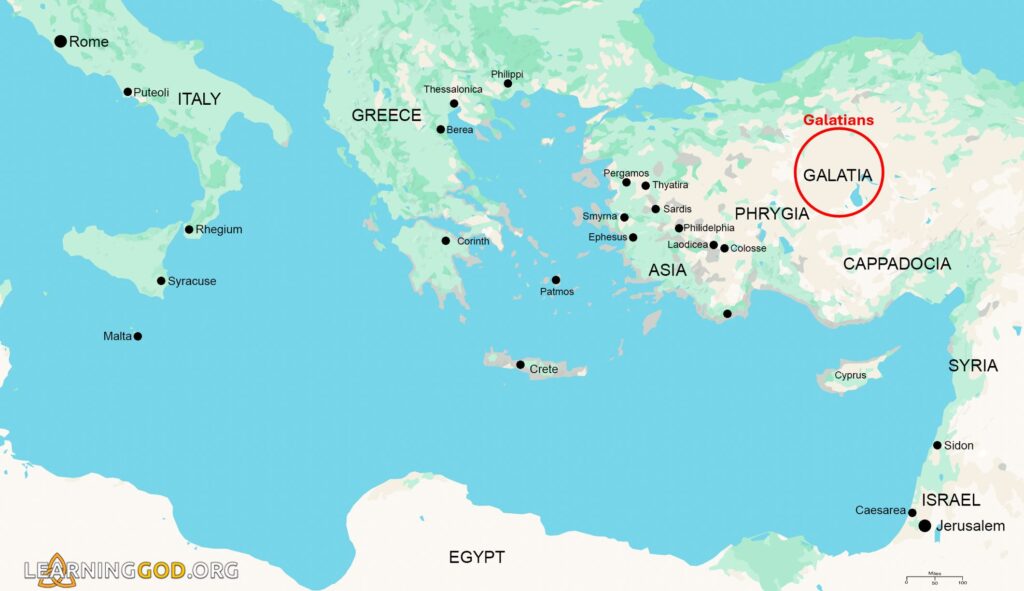Galatians
Justification by Faith
Summary | About | Why You Should Read it | Author | When Written | Context | Timeline | Location | Outline | Observations | Resources
Summary
The book of Galatians is Paul’s letter to the congregation at Galatia (part of Asia Minor at the time, today known as Turkey) that focuses heavily on correction. The main issue Paul is addressing is one in which Judaizers, who professed to follow Jesus, were convincing member of the mainly gentile church that they had to follow the Mosaic Law. Paul emphasizes in this epistle that Christians are no longer under the Mosaic Law. In Christ, we now have freedom from sin, the Mosaic Law and having to follow the doctrines of men.
Galatians stands as an eloquent and vigorous apologetic for the essential NT truth that people are justified by faith in Jesus Christ — by nothing less and nothing more — and that they are sanctified not by legalistic works but by the obedience that comes from faith in God’s work for them, in them and through them by the grace and power of Christ and the Holy Spirit. It was the rediscovery of the basic message of Galatians (and Romans) that brought about the Protestant Reformation. Galatians is often referred to as “Luther’s book,” because Martin Luther relied so strongly on this letter in all his preaching, teaching and writing against the prevailing theology of his day. It is also referred to as the “Magna Carta of Christian Liberty.”
The table below is a high-level look at the structure and contents of Galatians.

About
Galatians is the ninth book of the New Testament and the fourth written by Paul.

Why You Should Read It
While you won’t find many Judaizers around today trying to convince Christians to follow the Mosaic Law, these same principals apply very much to our world today. We are constantly inundated with messages saying that we are good enough on our own merits, or that there has to be more than one way to get to Heaven. We have a plethora of false doctrines being pushed on us constantly. When the Law was given and the people were under the Law, it was to point out that if you want to get to Heaven on your own merits, you can forget about it. No one is good enough.
It is in Christ that we have freedom from sin. This applies today as much as it ever did. We need to understand Paul’s arguments that speak against following any and all false doctrines.
Author
The author of this epistle is stated in the first verse to be Paul. Few argue this point.
When Written
Galatians is thought by most of the major expositors to be the first book written by Paul (chronologically, not in the order presented in the Bible). He most likely wrote it in the late 40’s, probably around 48 or 49 A.D. Some believe that Galatians was written from Syrian Antioch in after Paul’s first journey and before the Jerusalem council meeting (Ac 15). There are others who think the audience was northern Galatia, which might have been written after his second missionary journey in the 53-57 A.D. timeframe.
Context
Judaizers were Jewish Christians who believed, among other things, that a number of the ceremonial practices of the OT were still binding on the NT church. Following Paul’s successful campaign in Galatia, they insisted that Gentile converts to Christianity abide by certain OT rites, especially circumcision. They may have been motivated by a desire to avoid the persecution of Zealot Jews who objected to their fraternizing with Gentiles (see 6:12). The Judaizers argued that Paul was not an authentic apostle and that out of a desire to make the message more appealing to Gentiles he had removed from the gospel certain legal requirements.
Paul responded by clearly establishing his apostolic authority and thereby substantiating the gospel he preached. By introducing additional requirements for justification (e.g., works of the law) his adversaries had perverted the gospel of grace and, unless prevented, would bring Paul’s converts into the bondage of legalism. It is by grace through faith alone that people are justified, and it is by faith alone that they are to live out their new life in the freedom of the Spirit.
Timeline
The general order of events from the New Testament period of the early 50s to the early 60s is shown below.
Location
The general order of events from the New Testament period of the early 50s to the early 60s is shown below.
Outline
Introduction (1:1-10)
Greetings (1:1-5)
Denunciation (1:6-10)
Personal: Authentication of the Apostle of Liberty and Faith (1:11; 2:21)
Paul’s Gospel Was Received by Special Revelation (1:11-12)
Paul’s Gospel Was Independent of the Jerusalem Apostles and the Judean Churches (1:13; 2:21)
Evidenced by his early activities as a Christian (1:13-17)
Evidenced by his first post-Christian visit to Jerusalem (1:18-24)
Evidenced by his second post-Christian visit to Jerusalem (2:1-10)
Evidenced by his rebuke of Peter at Antioch (2:11-21)
Doctrinal: Justification of the Doctrine of Liberty and Faith (chs. 3-4)
The Galatians’ Experience of the Gospel (3:1-5)
The Experience of Abraham (3:6-9)
The Curse of the Law (3:10-14)
The Priority of the Promise (3:15-18)
The Purpose of the Law (3:19-25)
Sons, Not Slaves (3:26; 4:7)
The Danger of Turning Back (4:8-11)
Appeal to Embrace the Freedom of God’s Children (4:12-20)
God’s Children Are Children of the Free Woman (4:21-31)
Practical: Practice of the Life of Liberty and Faith (5:1; 6:10)
Exhortation to Freedom (5:1-12)
Life by the Spirit, Not by the Flesh (5:13-26)
Call for Mutual Help (6:1-10)
Conclusion and Benediction (6:11-18)
Observations
- The Book of Galatians has been called”
- The Magna Carta of Christian liberty.”
- The Christian’s Declaration of Independence.”
- It is believed that Paul wrote Galatians with his own hand rather than having dictated it to a secretary. 5:2; 6:11
- Paul wrote the Galatian letter in response to a report that the Galatian congregations were being taken over by the false teaching of some Judiazing teachers who professed Jesus, but at the same time sought to place Gentile converts under the requirements of the Mosaic Law.
- The term “Galatia” was used in two senses:
- Ethnographic – Referred to the central part of Asia Minor.
- Political (or provincial) – Referred to including territory to the south that was not originally considered a part of Galatia (Antioch of Pisidia, Iconium, Lystra, Derbe, etc.)
- Paul had to correct Peter in a matter at Antioch in Syria. 2:11-12
- In the Book of Galatians, Paul shows the superiority of Christianity over the Law of Moses.
- Words frequently used in the Book of Galatians:
- The law” – 31 times
- “Flesh” – 18 times
- “Spirit” – 15 times
- “Faith” – 21 times
- ‘The promise” – 10 times
- “Bondage” (and related words) – 11 times
- “The Cross.” – 6 times
- In Christ we now have:
- Freedom from sin.
- Freedom from the Law of Moses.
- Freedom from the doctrines of men.
“I have been crucified with Christ; it is no longer I who live, but Christ lives in me; and the life which I now live in the flesh I live by faith in the Son of God, who loved me and gave Himself for me.” Galatians 2:20
Sections in Galatians
- Defense of the True Gospel 1-2
- Doctrinal Teaching 3-4
- Practical Exhortation 5-6
Theme
- Justification comes by faith in Christ Jesus. not by works of the Law.
- Galatians is Paul’s correction of the wrong application of the doctrine of salvation, wanting to return to the law.
Jesus in Galatians
- Jesus is the source and power of the believer’s new life and the heir of the promises to Abraham’s seed (2:20; 3:1-16).


